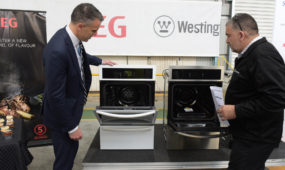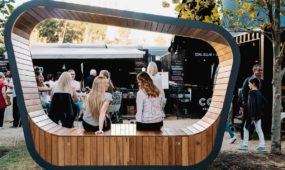Tindo Solar: bullish about South Australian manufacturing
Manufacturing
MANY have called South Australia a state in crisis. Historic industries like the automotive giants that drove the economy are offshoring and downsizing.

Sign up to receive notifications about new stories in this category.
Thank you for subscribing to story notifications.
The question that’s being asked – by everyone from the workers who were let go to the vast amount of manufacturer’s dependent on companies like Holden – is where do we go from here?
Richard Inwood, Tindo’s manager of business and people, describes himself as ‘bullish’ about the future of manufacturing in the state.
“Olympic Dam fell over. Holden has fell over. They’re major, major things. People are now focusing on the problem rather than just hoping that it’s going to work out okay,” Inwood explains.
He’s also a true believer; utterly convincing because, apart from the business smarts he brings to Tindo, his passion for renewables and the good they bring is real and sincere.
Inwood, who previously worked as a researcher at the CSIRO, is one of 50 Australians trained by Al Gore as a ‘Climate Reality Presenter’ and a talented public speaker on climate matters.
In many ways, Tindo and the message they bring to their customers is shaped by their competition; in this case not a declining industry, but rather a booming one dominated by international competitors.
“If you look at the overall marketplace, it’s around one and a half billion budgeted this year for panels to be installed somewhere in Australia, commercial or domestic. The vast, vast majority of that comes from overseas.”
“There were three of us in the beginning,” Inwood explains, “Adrian Ferraretto, our managing director, it was his vision to say ‘right, why can’t we do this in this country?’ We thought that’s a pretty worthwhile thing to work for.”
While the creation of the business may have been reactionary, Tindo’s methods and plans are not; there’s a lot of forward thinking put in to the future of the business.
Tindo has an emphasis on scalability – a hint at their plans to expand – and aren’t hesitating to experiment with new business models either.
It still begs the question, with so many manufacturing firms leaving South Australia or closing their doors altogether, can they compete with the lower cost Chinese opposition?
“We can. And we are,” Richard states, “the supplementary question is, well, how?”
There are two big challenges for Tindo: education and building volume. Both are, at their core, marketing issues.
“There is no testing in this country of panel output at all, other than what we do here. So what do the Chinese do in particular? They’re going to come in and tell a whole heap of fibs.”
“It would be good if people could rely on the facts and figures, much like they would do with a vehicle for example – you’ve got a crash test rating with however many stars and that’s true and trusted.”
The lack of standardised testing is an issue, and many panels don’t test in line with what they’re branded as. This is where Tindo start their engagement with customers.
“We have yet to test a Chinese panel that has been true to label, in terms of its nominated output. That’s a real question mark.”
Tindo earns their stars by way of their ‘Flash Tester’, also known as a ‘Sun Simulator’. During a flash test, the solar panel is exposed to a flash of light from a xenon filled arc lamp. The output spectrum of this lamp is as close to the spectrum of the sun as possible.
“People say they had no idea. The more people that know about us, the easier that challenge is – ‘that’s terrific, tell me more,’ and from there we can start a conversation.
“Once people understand the difference between the stuff that comes in to the country and what we can do in their local backyard, then there’s a trust factor, there’s a transparency factor and people say, ‘yeah, sure, let’s do it.’”
The challenge for the team at Tindo is getting their message out there within a limited marketing budget, but their transparent methods seem to be working.
“It’s an open door policy. We regularly have people knocking on the door asking for a tour, and we do that all day, every day,” Richard says.
Of course, marketing alone couldn’t help the business if production wasn’t feasible in the first place. For an advanced manufacturer like Tindo, automation and lean processes are a saving grace.
“This is viable because we work on volume, we work on genuine quality, we work on genuine output. It’s efficient because we can generally design, engineer, manufacture, sell and pull it out of our front door. No one else can do that in this country,” Inwood says.
“We have to have that innovative edge, that efficiency that comes with automation and innovation. Innovation is all about setting yourselves apart from the rest of the rabble.”
Unlike the largely hands-on factories often found in China, Tindo have cut down on labour costs by automating most of the process. Their entire 60MW capacity production line can be run with six to eight people.
“Materials cost is our biggest cost. It’s designed deliberately to be as economically efficient labour-wise.”
From the initial pieces of paneling being wired together to the flash test at the end of the line, the Tindo production snakes through the factory floor with very little human intervention – much of the work is ‘eyes-on’ rather than hands-on, including inspection and testing.
“We couldn’t operate like they would do in China for example, it just wouldn’t be tolerable. People love what they do here. They appreciate that it’s a quality, green, responsible product,” Inwood says.
“It’s highly automated, it’s not dirty, it’s fairly simple, light work making a high quality product.”
The production line is designed to be incredibly scalable, with a further two shifts able to be added when volume builds to required levels, something Inwoods thinks will happen soon as commercial and government projects pick up.
One of their latest and largest commercial projects is 400 panels right on the roof above their factory, which Tindo rents.
“It looks bloody impressive. The owner was adamant he wanted it. It was going to help him keep it rented and give him a payback period he wouldn’t have otherwise.”
For Inwood, the proposition he puts to a commercial operator is simple: “Keep paying the bill and not have anything to show for it at all, or have something that’s going to go the distance and give a return on investment.”
The South Australian Government has a longstanding relationship with solar, with policies implemented during Mike Rann’s time in power that helped build the economies of scale necessary to support the industry.
That’s one reason that South Australia has such a huge amount of solar panels; something much to its advantage during recent heat waves and power outages, taking a lot of strain from the grid.
“That’s all unwound now, so industry needs to stand on its own two feet. And it can.”
Inwood, for one, is a strong advocate of overhauling the state’s procurement policies – something he believes will not only help local businesses like Tindo, but create jobs and help to fill the gap left by Holden, which the state government is eager to do.
“It’s a multi-billion dollar procurement this government has. Let’s factor in a whole lot more local stuff. As a ballpark number, if we were to replace just 20 percent of what’s imported, we’re creating between 400 to 600 manufacturing jobs.
“We can take someone from Holden and within a day they’re fully functioning here. We can readily take a lot of those people – what we need is support to allow us to grow and take that challenge up.”
To be fair, Inwood says, the state government has been quite a supporter, and Tindo have found reasonably bipartisan support for what they’re trying to do.
He points to the the food manufacturer, Spring Gully, and the spontaneous campaign the public held that kept the company from going in to administration.
“The public are really supportive of trying to keep businesses in this state and this country. It’s important to people.”
Tindo expects to fill its second and third shift with newly announced government contracts and the launch of their Power Purchasing Agreement, which would see panels installed for free, instead selling the lower-priced energy produced to homeowners or commercial clients.
“The low socio folk who can’t afford energy as much as others get a bit of a breather and we get to employ a lot of people. We announced that as part of the election.”
For Inwood and Tindo, there are visions of a Silicon Valley type arrangement – a future of genuine, high quality manufacturing that builds on skills already in the state.
“Not going to the lowest common denominator, giving people some advantage, whether that’s service or longevity or output or quality or safety. That’s all key stuff,” Inwood says.
“If you’re going to play in the bottom sandpit then the competition is mad. It’s all on price. Then you get corners being cut, people getting hurt and dollars getting lost. That’s just a messy place to play.”
Tindo’s task then, is to get their message out there. Whether that’s by educating their potential customers, by winning government contracts or experimenting with new business models, they’ve got a challenge ahead of them – but plenty of opportunity, too.
Jump to next article



